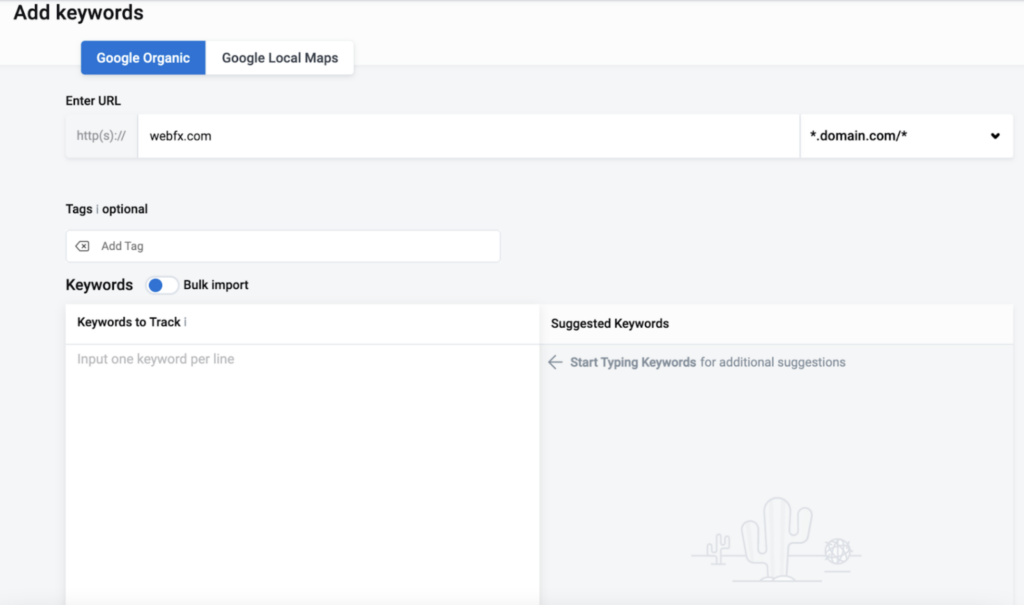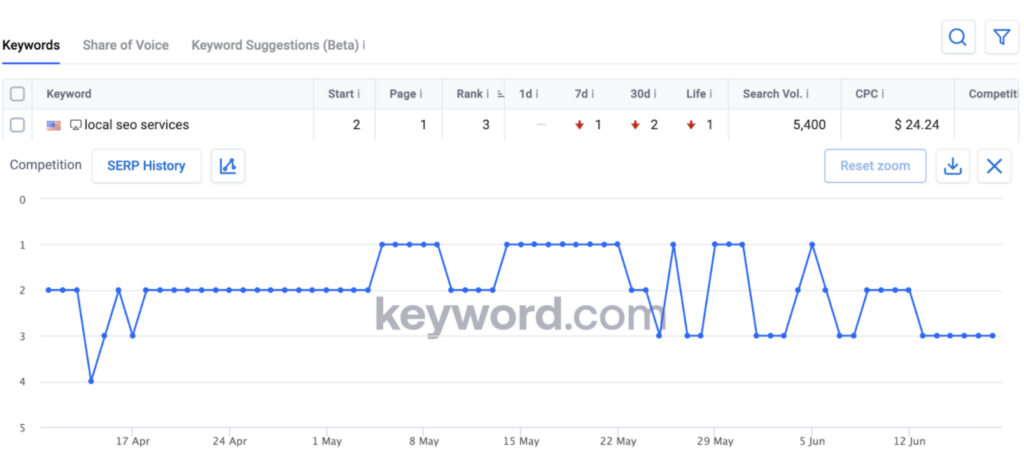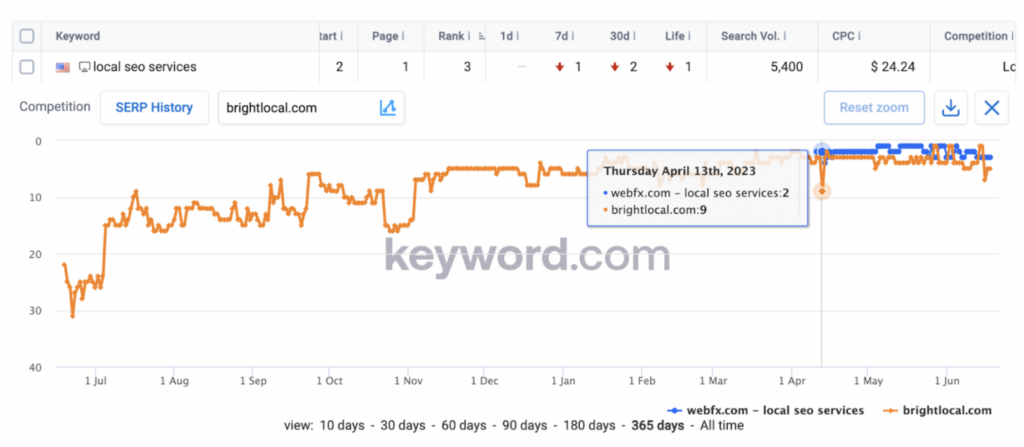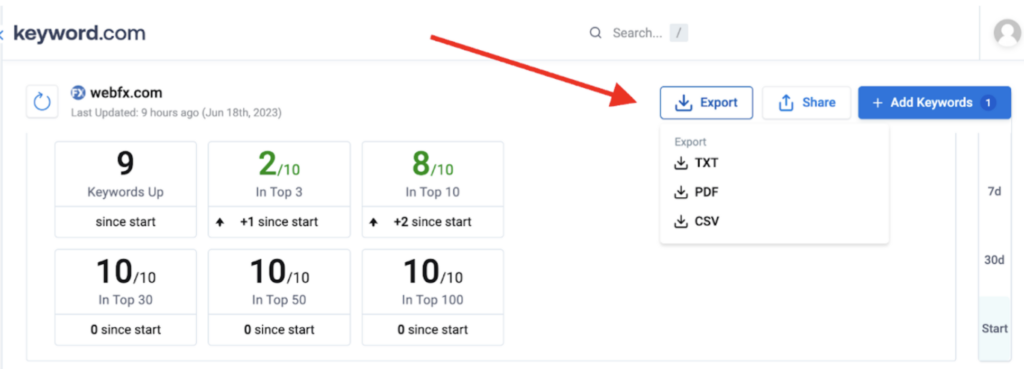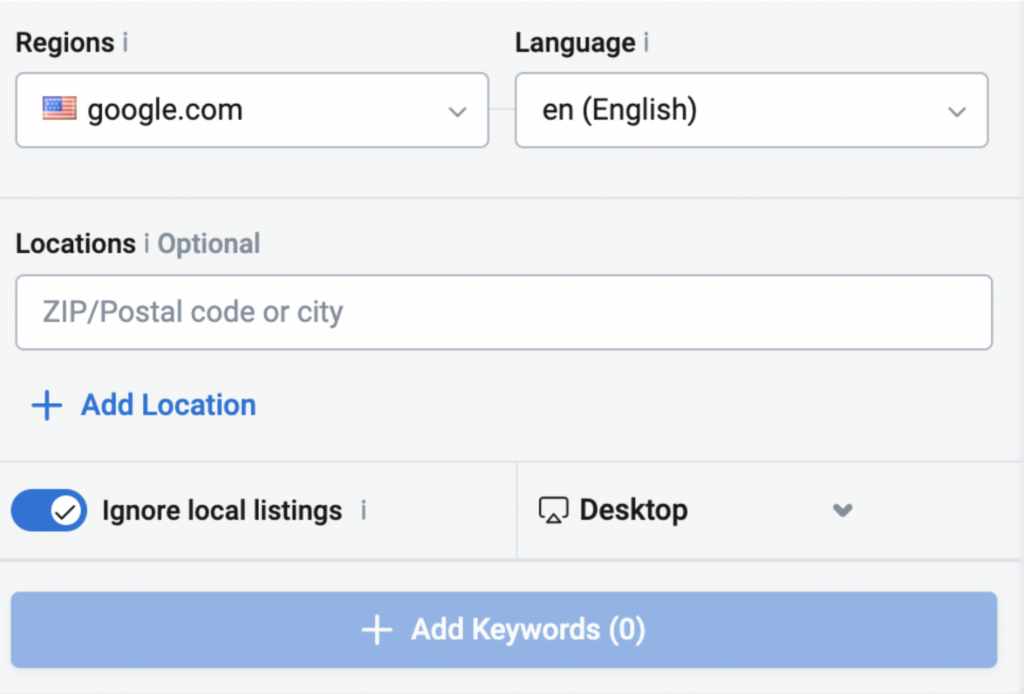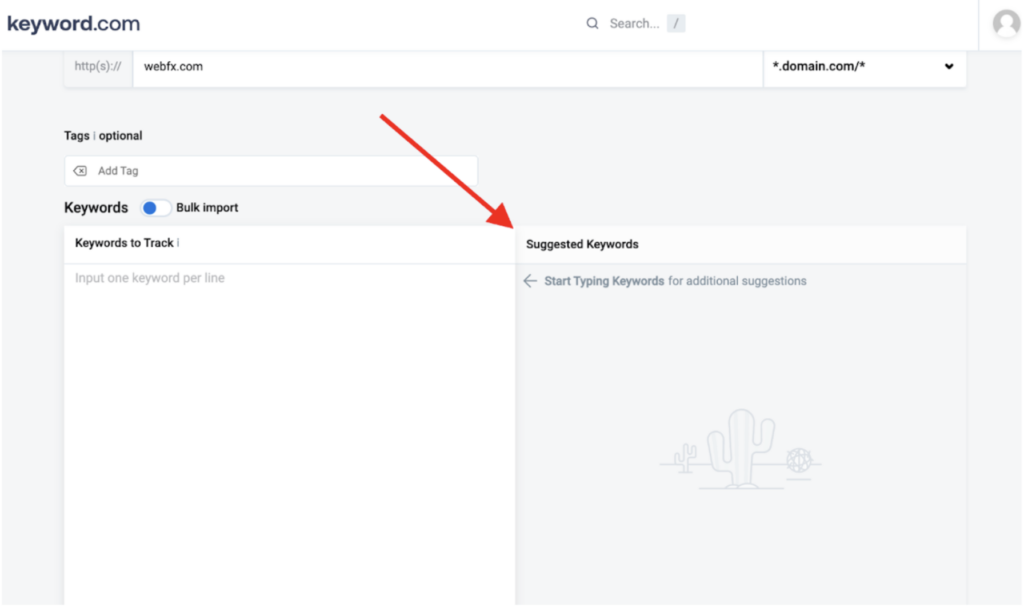Once you hit publish on a new piece of content, the next step is monitoring its performance in the SERPs to know how well your SEO strategy is working.
You can do this manually by typing relevant keywords into search engines and scrolling through numerous results in the hopes of finding your web page. Or, you can save time and get more accurate results if you rely on a tool that provides a detailed snapshot of SERP performance for different keywords in real time. This tool is called a rank tracker.
This article will explain how rank trackers work and why it is a must-have in your SEO toolkit.
How Does a Rank Tracker Work?
A rank tracker monitors SEO keyword ranking positions. This means it pulls and analyzes SERP data and shows you how specific keywords perform over time in the search results. Simply input the keywords you want to track and the corresponding website(s); the rank tracker does the rest of the work.
Beyond keyword performance, effective rank trackers like Keyword.com show important SEO data, such as keyword competition, search volume, and the number of search results. You can also connect it to your Search Console dashboard for granular data insights — like internal linking metrics and your website’s average SERP ranking.
Read our keyword monitoring best practices guide to learn more about ranking tracking tools.
Related:
Keyword Tracking Tools You Can Use for Your Business
Complete Guide on How to Set Up Keyword Tracking
How do you look at your keyword metrics?
Why use a rank tracker? 5 Reasons You Should Invest in a Keyword Rank Tracker
Why use a rank tracker? With a rank tracker, SEOs will operate smoothly and have concrete data to evaluate their progress.
An effective rank tracker lets you:
1. Monitor Keyword Performance in Real Time
Manual keyword tracking is slow, and it’s humanly impossible to keep up with the frequent changes in the SERPs. Relying solely on this method means you’ll miss out on up-to-date keyword data that can boost your strategy. Rank trackers update keyword positions daily, meaning you’ll always see a true reflection of what’s happening in the SERPs.
Real-time keyword performance monitoring has two key benefits:
-
Discover SERP Trends and Patterns
You can discover trends or patterns in the search results from the keyword’s historical performance data. For example, you might find that your web pages rank lower for specific keywords during the summer vacation months. Armed with this data, you’ll know not to fret when you see the seasonal drop in rankings.
-
Discover Performance Drops
Rank tracking lets you discover performance drops before they become a bigger issue. Say the data shows that you’re losing ranking for a particular keyword; you can quickly analyze the SERP to see what’s causing the problem and make page improvements to boost rankings.
2. Monitor Competitors’ Performance
You can see how your competitors rank for different keywords and track competitors’ keywords in a rank tracker. Keyword.com, for instance, lets you add your competitors’ websites and the different keywords you want to monitor to your rank checker directly. Alternatively, you can click on a keyword you’re already tracking and see how other sites rank for it right in your dashboard — like we have in the example below.
Insights from competitor analysis improve your SEO strategy. For example, you can analyze the top-ranking pages for a particular keyword and use this data to improve your content — to have a better chance of ranking higher in the SERPs.
Related:
How to track your competitors’ keywords.
3. Speed Up SEO Reporting
Rank trackers automate collecting and analyzing SERP data from scratch — a time-consuming task. This frees up time for you to focus on the more technical aspect of your job — like content optimization tweaks and implementing strategy updates.
Keyword.com, for instance, generates automated search ranking reports that you can share with stakeholders or clients. If you have multiple tools in your SEO kit, you can directly export SERP ranking data in different file formats — including PDF and CSV — or share it via a secure link with your other tools. Similarly, you can download competitor analysis data for all your keywords with the click of a button.
Related: What are rank tracking reports?
4. View Location-Specific Ranking Data
Good rank-tracking tools let you set specific target locations for SERP performance data. For instance, when adding a new list of keywords to Keyword.com, you can narrow the tracking down to particular zip codes and cities.
This information allows you to understand how your website performs in different regions, optimize your SEO strategies for specific markets, and tailor your content to meet the needs of local audiences. It also helps you identify opportunities for local search optimization and assess the effectiveness of location-based SEO efforts.
Say you run a barber shop in San Diego, but your website isn’t ranking for any barber-related keyword in the area; you’ll know how to optimize your local SEO strategy.
5. Discover New Keywords
The keyword suggestions rank trackers provide are valuable resources for expanding your keyword research and optimization efforts. They can inspire new content ideas, uncover untapped opportunities, and help you optimize your website for a broader range of search queries. For example, as you add new keywords to Keyword.com’s rank tracker, you automatically get related keyword suggestions that might have flown under your radar.
You also get keyword suggestions based on your Google Search Console data.
Check out our keyword monitoring guide for more insights on tracking the right keywords for SEO.
How to Choose the Best Rank Tracker for Your SEO Efforts
Now that you know why rank trackers matter for SEO, the next step is choosing a tool to take your strategy execution to the next level.
There are three crucial things to look out for before investing in a rank-tracking tool:
- Accurate and Reliable Data: It should consistently provide accurate data on keyword rankings across search engines. The rank tracker should query search engines frequently and precisely retrieve the rankings, ensuring that the data presented is up-to-date and reflects the actual performance of your website in search results.
- Comprehensive Tracking and Reporting: A good rank tracker offers extensive tracking capabilities, allowing you to monitor keyword rankings for multiple search engines, locations, and devices. It lets you narrow rank tracking to specific geolocations, such as country, state, or city.
- Advanced Analysis and Insights: A powerful rank tracker goes beyond basic ranking data and offers advanced analysis and insights. It provides features such as competitor analysis, search volume, keyword difficulty, and other metrics that help you make informed decisions in your SEO strategy.
Keyword.com checks these three boxes and more. Beyond rank tracking, our tool lets you track Share of Voice data for your keywords — so you know which sites dominate the SERPs and plan to outrank them.
Learn more about rank tracking with Keyword.com. Sign up and get 14 days free!
Rank Tracker FAQs
We’ve answered some of your common questions.
What Is a Rank Tracker?
A rank tracker is a software that helps you monitor the positions of your website’s pages in search engine results pages (SERPs) for specific keywords. Keyword.com is an excellent example of a rank tracker.
What Is Rank Checking in SEO?
Rank checking is another word for rank tracking or keyword monitoring. It is the process of monitoring the positions of a website’s pages in search engine results pages (SERPs) for specific keywords.
Why Is Rank Tracking Important?
Rank tracking is vital for monitoring your website’s performance in search engine results pages (SERPs) and optimizing your SEO efforts. It helps you assess the effectiveness of your optimization strategies, optimize your content for specific keywords, analyze competitors’ rankings, measure ROI, and make data-driven decisions.
By tracking your rankings, you can understand how well your website performs, identify improvement areas, and shape your SEO strategy accordingly.
